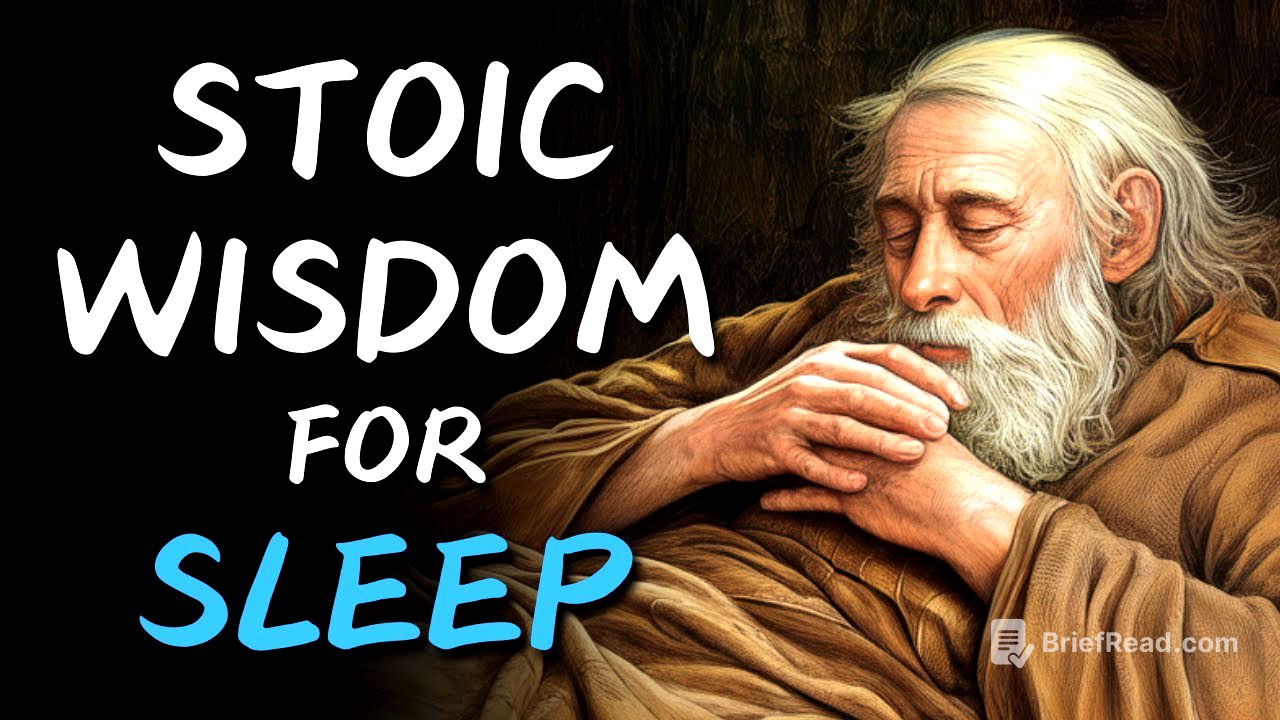TLDR;
This YouTube video explores the wisdom of stoicism to help viewers navigate relationships, recognize unreliable personalities, detect insincerity, and cultivate inner strength. It provides practical advice and real-life examples to foster meaningful connections and protect emotional well-being. Key points include:
- Identifying and distancing from unreliable individuals like narcissists, gossipers, and manipulators.
- Recognizing signs of insincerity such as selective availability, lack of personal interest, and constant self-focus.
- Cultivating inner strength through self-reliance, emotional mastery, and a focus on personal values.
- Prioritizing genuine connections based on mutual respect, trust, and authenticity.
Introduction to Ancient Wisdom and Stoicism [0:00]
The video introduces Ancient Wisdom as a sanctuary for relaxation and reflection, inviting viewers to subscribe and share their location and current time. It sets the stage for a discussion on how to identify and distance oneself from unreliable people using stoicism, an ancient philosophy focused on resilience, inner peace, and meaningful relationships. The video promises practical insights into navigating challenging relationships with wisdom and clarity.
Identifying Narcissists and Maintaining Distance [2:04]
Narcissists are excessively self-centered individuals who prioritize their needs and lack empathy. Stoicism advises maintaining a healthy distance from them because their self-absorption makes genuine, supportive relationships difficult. Examples include a friend who dominates conversations and a colleague who takes credit for your ideas. To protect your well-being, recognize their behavior, manage expectations, and seek relationships with mutual respect and empathy.
Avoiding Gossipers and Upholding Trust [3:52]
Gossipers spread secrets and create distrust, lacking the stoic values of discretion and integrity. An example is a colleague who shares office rumors, revealing that nothing remains private. Stoicism emphasizes associating with individuals who uphold trust and integrity. To protect your peace of mind, avoid sharing personal details with gossipers and seek friends who respect confidentiality and promote positive conversations.
Dealing with Provocators and Maintaining Inner Calm [5:06]
Provocators consistently cause irritation through subtle provocations, disrupting peace and contradicting the stoic principle of tranquility. An example is a friend who makes snide remarks disguised as jokes. Stoicism teaches maintaining inner calm and setting clear boundaries. Surround yourself with supportive people who foster mutual respect.
Navigating Indecisive Individuals and Seeking Stability [6:06]
Indecisive individuals constantly waver in their decision-making, leading to unpredictability. An example is a friend who frequently changes plans. Stoicism values clear and rational decision-making. To avoid chaos, seek relationships with decisive and consistent individuals, ensuring a stable social circle.
Distancing from Two-Faced People and Building Trustworthy Networks [7:06]
Two-faced people appear friendly but spread rumors, betraying trust and loyalty. An example is a coworker who criticizes you behind your back. Stoicism values honesty and integrity. To protect yourself, recognize and distance yourself from such individuals, building relationships with genuine and trustworthy people.
Limiting Interactions with Overly Curious Individuals and Protecting Privacy [8:04]
Overly curious people intrude on your privacy, often driven by envy, disrupting your peace. An example is a neighbor who asks intrusive questions. Stoicism teaches contentment and minding one's own business. To maintain peace, limit interactions with such individuals and set boundaries to protect your privacy.
Cultivating Meaningful Relationships over Superficial Connections [9:02]
Universal friends seek approval and lack genuine loyalty, making them unreliable. An example is a friend who is friendly with everyone but never truly there for anyone. Stoicism values deep, meaningful relationships over superficial connections. Cultivate friendships with committed and loyal individuals for mutual support.
Distancing from Perpetual Critics and Fostering Positivity [9:57]
Perpetual critics habitually criticize, undermining self-esteem and fostering negativity. An example is a family member who always finds something to criticize. Stoicism encourages constructive feedback, not constant criticism. Distance yourself from perpetual critics and surround yourself with supportive individuals.
Avoiding Constant Problem Makers and Promoting Peace [10:48]
Constant problem makers are always embroiled in conflicts, disrupting harmony and creating stress. An example is a friend who is always involved in some drama. Stoicism teaches resilience and focusing on what can be controlled. Seek relationships with individuals who promote peace and stability.
Engaging with Genuine Listeners and Showing Empathy [11:34]
Fake listeners pretend to listen but are not genuinely engaged, making them unreliable. An example is a friend who nods along but never remembers anything you've said. Stoicism values genuine connection and understanding. Engage with people who truly listen and show empathy, ensuring mutual respect and trust.
Recognizing and Avoiding Manipulative Individuals [12:14]
Manipulative individuals use deceit to achieve their goals, undermining trust in relationships. An example is a partner who manipulates situations to their advantage. Stoicism advises caution with such individuals to maintain personal integrity and peace. Recognize manipulative behavior and seek relationships based on honesty and mutual respect.
Distancing from Chronic Complainers and Maintaining a Positive Outlook [13:09]
Chronic complainers consistently focus on the negative, draining emotional energy. An example is a colleague who always complains about everything. Stoicism teaches resilience and focusing on what can be controlled. Distance yourself from chronic complainers and surround yourself with individuals who take responsibility and strive for positive change.
Conclusion: Cultivating Fulfilling and Harmonious Relationships [13:57]
The people we surround ourselves with shape our experiences and emotions. Recognizing and distancing ourselves from unreliable personalities is a step toward a more fulfilling existence. Applying stoicism helps cultivate relationships that nurture well-being and foster mutual respect.
Introduction to Deception and Subtle Signs [15:48]
The chapter introduces the subtle art of deception and the human tendency to conceal the truth. It explores the idea that those closest to us may engage in deceptions, not always out of malice, but often out of fear or insecurity. The chapter encourages examining the subtle signs that someone might be hiding the truth, not in judgment, but in curiosity, to understand human behavior better.
Laughing Off Serious Topics as a Form of Avoidance [18:12]
Laughing off serious topics is a way of dodging accountability and hiding from the truth. Using humor to deflect creates a barrier to real communication and signals emotional immaturity. Honest conversations are necessary for real relationships, and humor shouldn't be a wall between you and the truth.
Micro Expressions of Guilt or Fear as Indicators of Hidden Feelings [21:00]
Micro expressions, tiny facial expressions, can reveal emotions like guilt or fear, even when someone tries to hide them. These spontaneous reactions are genuine indicators of hidden feelings. Paying attention to these subtle signs can provide insights into what's actually going on, helping you trust your instincts and be more aware in interactions.
Body Language as a Sign of Discomfort or Deception [23:27]
Body language, especially when someone's body is subtly turned away, can indicate discomfort or deception. This involuntary response suggests they're hiding something or feeling uneasy with the conversation. Paying attention to these nonverbal cues can provide clues about deeper issues.
Changing the Subject as a Tactic to Avoid Uncomfortable Truths [25:35]
Changing the subject during critical discussions is often a tactic to dodge uncomfortable truths. If someone truly respects you, they'll stay with you in those hard conversations. Bringing them back to the original topic can keep them accountable, and their continued avoidance is a sign of discomfort with the truth.
Excessive Justifications as a Sign of Deceit [27:41]
People who are hiding something often feel the need to overexplain, piling on details to sound believable. When explanations feel overly polished and rehearsed, it's worth paying attention. Honesty usually doesn't need a lot of padding, so an overly elaborate story might be covering something up.
Vagueness When Pressed for Specifics as a Telltale Sign [29:42]
Vagueness often points to something deeper, as people use it to avoid accountability. It's easier to backpedal on a vague statement than on a concrete detail. If someone truly has nothing to hide, they won't mind giving you specifics. Dodging details should be taken as a sign, and follow-up questions can reveal their reasons for avoiding the truth.
Inconsistent Stories as Indicators of Falsehood [31:33]
Inconsistencies in someone's story can signal falsehood. If someone is telling the truth, their story usually stays the same, even when repeated. Small changes and discrepancies should be noted, and clarification should be sought. Liars often struggle to keep track of too many falsehoods, making their stories inconsistent.
Defensiveness as a Sign of Hidden Information [33:16]
An over-the-top defensive reaction to a simple question can be a sign that something's wrong. While defensiveness can be a natural response to criticism, an extreme reaction to a harmless question often means the person is hiding something. Honest people are usually calm, straightforward, and open, while those with something to hide may become aggressive.
Not Listening as a Sign of Preoccupation with Deception [34:48]
Not listening can be a sign of deception, as someone lying or hiding something may be preoccupied with managing their own narrative. They may nod and smile but rarely respond in a way that makes you feel heard. This lack of engagement is a red flag, as genuine people will be actively listening and responding meaningfully.
Overpolished Details as a Sign of Rehearsed Stories [36:20]
Overpolished details in a story can be a sign that it's been rehearsed. Real life is messy and unpredictable, rarely following a flawless script. If someone's story sounds too perfect, it may be exaggerated or fabricated. Real memories are rarely flawless, so take a step back and ask clarifying questions.
Conclusion: Cultivating Awareness and Embracing Honesty [37:55]
The chapter concludes by emphasizing that detecting lies is about cultivating awareness and tuning into the dance of honesty and concealment. Understanding these signs invites deeper presence with others and ourselves. The more we seek honesty in others, the more we must embrace it within ourselves.
Stoic Principles for Daily Living [39:55]
This chapter lists stoic principles for daily living, such as appreciating resilience, avoiding emotional decisions, practicing kindness, embracing change, learning from pain, being true to yourself, investing in lifelong learning, avoiding bad company, recognizing true intentions over time, prioritizing health, controlling thoughts, embracing failures, being patient, appreciating those who value you, taking action, practicing silence when angry, prioritizing direction over speed, learning from every experience, releasing grudges, facing fears, showing interest, cultivating gratitude, being yourself, trusting actions, pursuing your desires, valuing your time, understanding the benefits of wealth, avoiding guilt for self-care, creating your own family, and finding strength in overcoming hurt.
More Stoic Principles for Daily Living [52:11]
The chapter continues listing stoic principles, including understanding that money helps solve problems, prioritizing self-respect over emotions, being kind but setting boundaries, accepting life's changes, healing without venting to everyone, living life fully, understanding that discipline is self-respect, staying strong when things fall apart, walking your own path, saying no without guilt, avoiding gossip, keeping plans private, cherishing memories, learning by listening, letting go of anger, recognizing limits, understanding that loneliness can accompany self-improvement, choosing friends wisely, being good without proving it, staying patient, handling adversity, accepting criticism, viewing failure as temporary, focusing on yourself, being yourself despite judgment, taking responsibility for your dreams, controlling your mind, being loyal, understanding that attachment causes suffering, knowing your limits as a giver, overcoming obstacles, taking finances seriously, ignoring those who bring you down, learning from losses, being wary of stupid people, expecting nothing and appreciating everything, understanding that loneliness accompanies self-improvement, saying no firmly, maintaining privacy, accepting that not everyone will like you, agreeing to disagree, understanding that other people's opinions are irrelevant, avoiding going broke to impress others, balancing success and humility, making peace with your past, valuing experiences over possessions, understanding that nobody likes arrogance, staying calm for clearer thinking, understanding that heartbreak can improve your vision, avoiding overexplaining, mastering yourself, surrounding yourself with better people, understanding that honesty earns trust, understanding that stress teaches lasting lessons, believing actions over words, being forgiving but not foolish, not comparing your journey to others, learning from every day, understanding that your life is your responsibility, understanding that society's advice often lacks insight, being grateful for small things, using solitude to reconnect with yourself, staying patient, starting now to change your ending, healing without venting, keeping some things to yourself, doing things alone, trusting the process, never taking anything personally, and surviving your thoughts to survive anything.
Introduction to Stoic Philosophy and Practical Wisdom [1:27:03]
The chapter introduces stoic philosophy as a means to find true happiness and inner peace in today's chaotic world. It promises to explore 12 powerful ideas that can transform our perspective, empower our actions, and help us lead a life of wisdom and purpose. The first principle is practical wisdom, which involves applying rational principles to daily life and making decisions that align with moral and ethical standards.
Justice, Brotherhood, and Interconnectedness [1:29:31]
The Stoics believed in the interconnectedness of humanity, advocating for justice and brotherhood. Understanding others' perspectives is crucial for fostering forgiveness and reducing conflict. Justice involves treating others fairly and with respect, contributing to the common good. This communal approach enhances societal harmony and enriches our own lives.
Control and Acceptance: Finding Happiness in What You Can Influence [1:32:21]
A central tenet of Stoic philosophy is the concept of control and acceptance. Happiness is found in recognizing and accepting what is within our control and letting go of what is not. Focus energy on thoughts, actions, and responses, which are within our power, rather than external events.
Reflection and Self-Improvement as a Continuous Journey [1:32:21]
Stoicism places a strong emphasis on reflection and self-improvement. Regular self-reflection is crucial for personal growth, allowing us to assess our actions, thoughts, and motivations critically. Self-improvement is an ongoing journey that requires humility and a willingness to acknowledge and correct our faults.
Purpose and Duty: Embracing Your Unique Role [1:33:39]
Understanding and fulfilling one's purpose and duties in life is a cornerstone of Stoic philosophy. Each person has a unique role to play, and by embracing this role with integrity and commitment, we find true contentment. Purpose is not just about personal ambition, but also about contributing to the greater good.
Mindfulness of Mortality: Living Each Day with Purpose [1:35:07]
The reminder of our mortality encourages us to live each day with purpose and gratitude. The awareness of death should not be a source of fear, but a motivator to live fully and meaningfully. By acknowledging that our time is limited, we become more mindful of how we spend each moment, prioritizing what truly matters.
Emotional Mastery: Controlling Emotions for Clear Judgment [1:36:27]
Mastering one's emotions is a fundamental aspect of Stoic philosophy. True power comes from controlling our emotions rather than being controlled by them. Emotions such as anger, fear, and jealousy are seen as distortions that cloud our judgment and hinder rational thinking.
Self-Reliance and Virtue: Finding Contentment Within [1:37:54]
True happiness and contentment come from within. Self-reliance and the cultivation of virtue are essential for a fulfilling life. External possessions and circumstances do not determine our well-being. Rather, it is our inner state and adherence to moral principles that matter.
Community and Cooperation: Embracing Interconnectedness [1:39:17]
The Stoics emphasize the importance of community and cooperation, recognizing that humans are inherently social beings. Embracing the interconnectedness of humanity fosters empathy, altruism, and mutual support. This principle encourages us to view others as fellow members of a universal community, working together for the common good.
Dealing with Adversity: Building Resilience Through Hardship [1:40:37]
Building resilience through voluntary hardship is a key stoic principle for dealing with adversity. By intentionally facing challenges, we strengthen our character and prepare ourselves for life's inevitable difficulties. This practice involves embracing discomfort and viewing obstacles as opportunities for growth.
Living in the Present: Maximizing Experiences and Time [1:42:04]
The Stoic philosophy emphasizes the importance of living in the present. By focusing on the here and now, we maximize our experiences and make the most of our time. Excessive concern for the past or future diminishes our ability to appreciate and engage with the present moment.
Perspective on Death: Accepting Mortality for Personal Growth [1:43:23]
Accepting death as a natural part of life is a cornerstone of Stoic philosophy. Death is not inherently terrifying; it is our perception that causes fear. By understanding and accepting the inevitability of death, we can live more fully and courageously.
Introduction to Stoic Principles for Valued Relationships [1:45:52]
The video addresses the paradox of feeling isolated despite constant connectivity and explores stoic wisdom to become more valued and appreciated. It introduces principles to foster genuine connections and build relationships based on mutual respect and integrity.
Prioritizing Your Own Needs and Cultivating Self-Respect [1:46:27]
Prioritizing your own needs is essential for building self-respect, which attracts others. Setting aside time for self-care is an example of this principle.
Cultivating Independence and Standing by Your Values [1:47:24]
Self-reliance and independence make you more confident and attractive to others. Making decisions without constantly seeking external approval is key.
Creating a Sense of Absence to Enhance Appreciation [1:48:08]
Being occasionally unavailable allows others to recognize and appreciate your presence more. Don't always be the first to respond or drop everything to meet up.
Setting Boundaries on Availability and Respecting Your Time [1:48:43]
Learning to say no respectfully helps prioritize your needs and ensures that your availability is valued. Respecting your own time teaches others to do the same.
Letting Others Initiate Conversations and Valuing Their Thoughts [1:49:18]
Allowing others to start conversations shows that you value their thoughts and opinions, fostering deeper connections.
Embracing Patience and Maintaining Emotional Control [1:49:47]
Patience is a powerful tool in stoicism, projecting strength and stability. Stay calm and composed in stressful situations instead of reacting impulsively.
Keeping a Little Mystery to Maintain Interest [1:50:25]
Maintaining a bit of mystery about yourself can make others more interested in you. Gradually share your thoughts and experiences to keep others intrigued.
Encouraging Others to Invest in You and Building Stronger Bonds [1:51:07]
Allowing others to contribute to your life helps build stronger bonds. When people offer advice, assistance, or support, they feel valued.
Focusing on Quality over Quantity in Relationships [1:51:47]
Focus on the quality of interactions rather than the quantity. Deep, meaningful conversations and connections are more valuable than numerous superficial interactions.
Practicing Generosity to Enhance Your Value to Others [1:52:24]
Generosity, whether it's in the form of time, resources, or knowledge, can greatly enhance your value to others. Help others without expecting anything in return.
Conclusion: Transforming Relationships and Yourself [1:53:02]
Applying these stoic principles can significantly impact how others perceive and value you. The goal is to foster genuine connections and build relationships based on mutual respect and integrity.
Introduction to Stoic Principles for Demonstrating Worth [1:53:57]
The video explores how to command respect and demonstrate worth without saying a word, using stoic philosophy and real-life examples.
Developing Resilience and Maintaining Composure [1:54:33]
Resilience is about maintaining dignity and composure regardless of adversity. Embrace challenges as opportunities for growth and learning.
Focusing on Actions, Not Words, in Relationships [1:56:11]
Actions reveal true intentions more than words ever could. Observe consistent and genuine actions to discern someone's character.
Embracing Healthy Skepticism to Protect from Disappointments [1:57:14]
A dose of skepticism can protect you from potential disappointments in relationships. Be mindful and observant, evaluating situations carefully.
Knowing Your Worth and Maintaining Self-Respect [1:58:24]
Your worth is intrinsic and not dependent on external validation. Focus on your virtues and live a life you are proud of.
Cultivating Gratitude and Fostering a Positive Outlook [1:59:26]
Gratitude helps you recognize your achievements and qualities, reinforcing your sense of worth and positively influencing how others perceive you.
Limiting Access to Enhance Perceived Value [2:00:24]
Maintaining a sense of mystery and depth can enhance your perceived value. Be selective about who you let into your life.
Practicing Unconditional Love and Showing Empathy [2:01:21]
Unconditional love involves recognizing the intrinsic worth of every individual and showing empathy and compassion.
Being Prepared to Walk Away and Valuing Your Worth [2:02:24]
Be willing to walk away from situations that compromise your values. This demonstrates your commitment to self-respect and integrity.
Presenting Yourself with Dignity and Authenticity [2:03:20]
Presenting yourself with dignity means being true to who you are rather than trying to impress others with superficialities.
Acting with Boundaries and Demonstrating Self-Respect [2:04:10]
Setting and maintaining boundaries is a powerful way to demonstrate your self-respect.
Seeking Solitude for Self-Reflection and Reinforcing Self-Worth [2:05:08]
Taking time to be alone and reflect helps you understand your true self and values without external influence.
Focusing on What You Can Control and Maintaining Dignity [2:06:14]
Focus on what you can control and let go of what you cannot. Value your worth and let things flow naturally, maintaining your dignity.
Conclusion: Demonstrating Worth Through Actions and Integrity [2:07:05]
Embracing stoic principles empowers you to demonstrate your worth through actions, set healthy boundaries, and maintain your self-respect.
Introduction to Stoic Principles for Unshakable Confidence [2:07:41]
The video introduces 12 Stoic-inspired principles for building unshakable confidence, focusing energy, and outsmarting life's chaos, providing practical tools for modern resilience.
Nurturing Aspirations in Silence for Strength and Focus [2:08:46]
Keep dreams close and let them grow quietly before exposing them to the outside world. This protects them from doubts and helps maintain focus on internal motivation.
Avoiding Gossip and Focusing on Self-Improvement [2:10:45]
Avoid gossip and turn focus inward for self-improvement. This cultivates a mindset focused on growth, compassion, and self-awareness, contributing to a culture of respect and inner peace.
Protecting Your Energy by Setting Boundaries [2:12:41]
Manage energy wisely by setting boundaries around draining activities and people, prioritizing those that uplift and align with values. This invests in resilience and the ability to be present.
Avoiding Boasting and Finding Fulfillment in the Work Itself [2:14:34]
True success doesn't need a spotlight. Focus on the work itself rather than accolades, finding fulfillment in learning and growing.
Keeping Your Next Move Private to Protect Focus [2:16:41]
Keep plans close to protect focus and avoid external influence. Act in silence to stay committed and ensure goals are unclouded.
Practicing Gratitude in Solitude for Contentment and Resilience [2:18:35]
Practice gratitude in solitude to connect deeply with what truly matters, fostering contentment and resilience.
Guarding Your Weaknesses for Self-Improvement [2:20:41]
Work on weaknesses privately to protect from scrutiny and improve at your own pace, building self-reliance.
Avoiding Overthinking and Dwelling on Challenges [2:22:38]
Address challenges with a solution-oriented mindset, directing energy toward what can be controlled instead of fixating on what's wrong.
Keeping Your Kindness Private for Pure Intentions [2:24:28]
Do good quietly for its own sake, fostering a compassionate mindset and inspiring others to act in the same way.
Seeking Feedback Wisely from Trusted Sources [2:26:25]
Choose mentors and confidants who genuinely understand your goals and have your best interests at heart, creating a support system rooted in trust.
Valuing Discretion and Choosing Who You Trust [2:28:16]
Protect your boundaries and choose carefully who you let into your inner circle, creating a safe space for vulnerability and authenticity.
Practicing Strategic Solitude for Self-Discovery and Growth [2:30:00]
Embrace solitude as a time to reflect, align with values, and cultivate inner peace, enhancing relationships and overall well-being.
Conclusion: Embracing Stoic Principles for a Purposeful Life [2:32:07]
The video concludes by encouraging viewers to embrace stoic principles for a resilient, virtuous, and fulfilling life, inviting them to share their thoughts and inspire each other.
Introduction to Stoic Rules for Conquering the Day [2:33:07]
The video introduces 20 stoic rules to transform your daily routine and mindset, empowering you to lead an extraordinary life with purpose, virtue, and excellence.
Controlling Your Response to Situations [2:34:37]
Focus on your reaction rather than the situation itself. Choose responses that align with your values and virtues.
Striving for Continuous Self-Improvement [2:36:17]
Commit to making small, deliberate steps every day to hone your skills, expand your knowledge, and refine your character.
Handling Difficult People with Serenity, Kindness, and Grace [2:37:54]
Respond with calmness and composure, treating others with kindness, even when it is undeserved.
Staying Present and Handling What Is in Front of You [2:39:29]
Concentrate on the task at hand, giving it your full attention and effort.
Viewing Challenges as Essential for Discovering Your True Strength [2:40:52]
Embrace challenges as opportunities to demonstrate resilience and perseverance.
Embracing Challenges as Opportunities for Growth with Greater Rewards [2:42:27]
See difficult tasks as valuable opportunities for personal development.
Choosing Strength over Weakness, Courage over Cowardice, and Virtue over Vice [2:44:06]
In every situation, choose how you will act, building resilience, facing fears, and aligning yourself with your highest ideals.
Beginning Each Day by Envisioning How You Want to Feel at the End of It [2:45:30]
Reflect on your goals and the kind of person you aspire to be, guiding you through the day with purpose.









